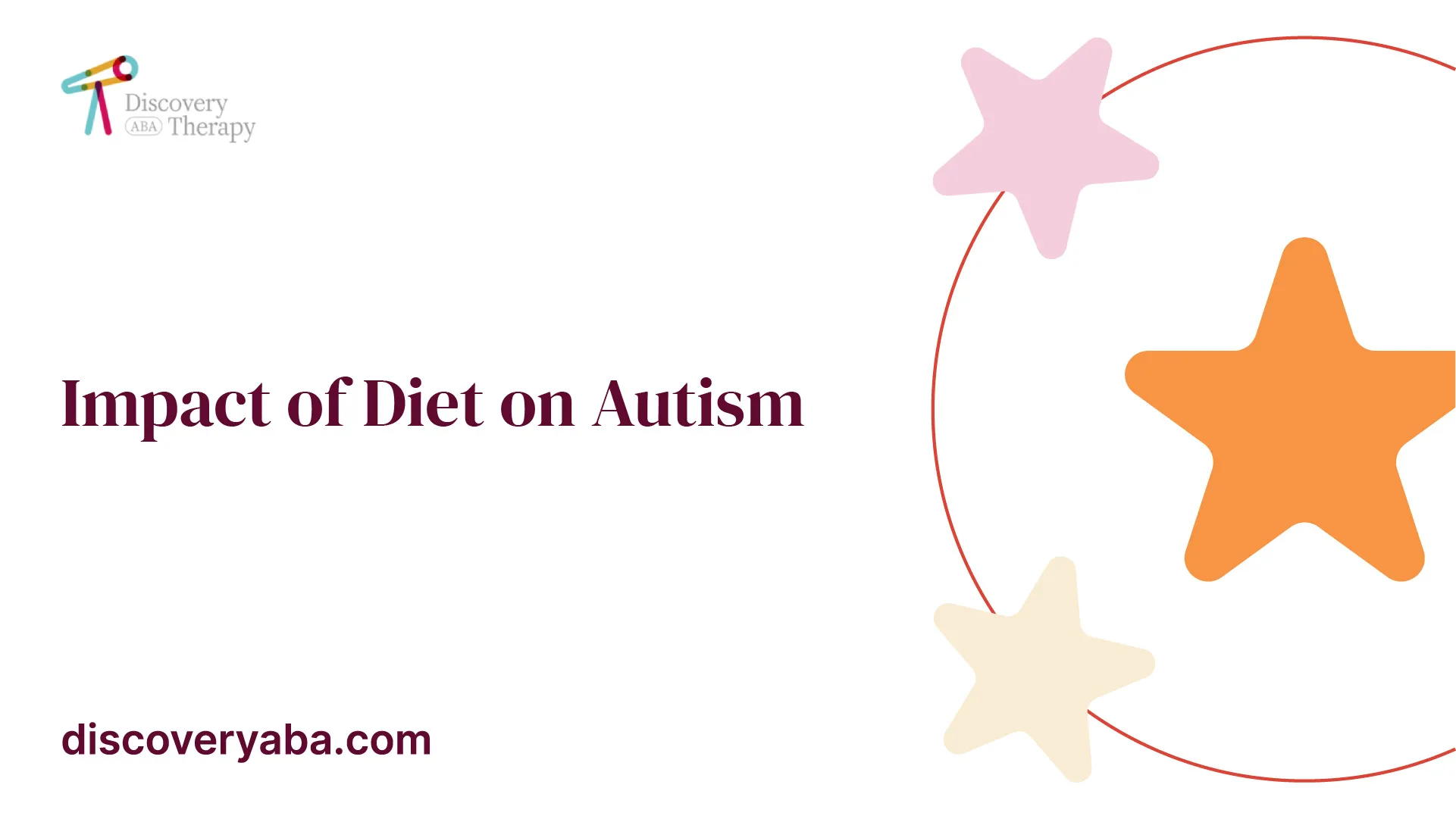Nutrition and Diet in Autism
Discover the powerful impact of nutrition and diet on autism. From dietary challenges to therapeutic diets, unlock the potential for better support.


Nutrition and Autism
Proper nutrition plays a crucial role in supporting individuals with autism spectrum disorder (ASD). However, children with ASD often face unique challenges when it comes to their eating habits and gastrointestinal health. In this section, we will explore the issues of food refusal in children with autism and the gastrointestinal problems they may experience.
Food Refusal in Children
Children with autism spectrum disorder (ASD) tend to exhibit more food refusal compared to typically developing children. According to a study, children with ASD refused approximately 41.7% of the foods offered, while typically developing children refused only 18.9% of the foods offered. This heightened food refusal can make mealtimes challenging for both the child and their caregivers.
The reasons behind food refusal in children with ASD can vary. Sensory issues, such as aversions to certain textures, flavors, or smells, can significantly impact their willingness to eat. Additionally, rigid eating patterns and a strong preference for specific foods are common in children with autism. These preferences may limit their dietary variety and potentially lead to nutrient deficiencies.
Gastrointestinal Issues and Eating Problems
There is a strong relationship between eating problems and gastrointestinal (GI) dysfunction in children with autism. Research has shown that children with ASD experience significantly more feeding problems and consume a narrower range of foods compared to their neurotypical peers. GI issues, such as constipation, diarrhea, and abdominal pain, are commonly reported in children with autism.
The connection between gastrointestinal problems and autism is an area of ongoing research. The specific mechanisms and underlying causes are not yet fully understood. However, it is believed that disruptions in gut microbiota, immune dysregulation, and altered gut-brain communication may contribute to these GI issues in individuals with autism.
It is important for caregivers and healthcare professionals to address and manage the GI issues and eating problems experienced by children with autism. A multidisciplinary approach involving healthcare providers, such as pediatricians and gastroenterologists, along with dietitians or nutritionists, can help in developing appropriate strategies to improve the nutritional status and overall well-being of these children.
Understanding and addressing the unique challenges related to nutrition and eating habits in children with autism is crucial for their overall health and development. By working closely with healthcare professionals and implementing targeted interventions, it is possible to support children with autism in achieving a well-balanced diet and optimal nutritional status.
Dietary Challenges in Autism

Individuals with autism often face unique dietary challenges that can impact their overall health and well-being. Two common challenges include sensitivities to dairy and wheat, and nutrient deficiencies that can lead to various health risks.
Dairy and Wheat Sensitivities
Some children with autism may have negative reactions to milk or dairy products due to lactose or casein intolerance, although it may not always be classified as an allergy [1]. These sensitivities can manifest as gastrointestinal discomfort, digestive issues, or behavioral changes. Similarly, sensitivities to wheat, which contains gluten, can also affect individuals with autism. Research suggests that gluten can increase systemic inflammation and impact the functioning of the cerebellum, which is crucial for processing complex information [2].
Understanding and managing these sensitivities is essential for optimizing the nutrition and overall well-being of individuals with autism. While some individuals may need to eliminate dairy and wheat from their diet, it is important to consult with a healthcare professional or registered dietitian to ensure a balanced and nutritious diet is maintained.
Nutrient Deficiencies and Health Risks
Studies indicate that children with autism and autism spectrum disorders (ASDs) are more likely to have nutrient deficiencies, which can lead to various health risks [3]. These deficiencies can arise due to selective eating patterns, limited food preferences, or restrictive diets often associated with autism.
Common nutrient deficiencies seen in individuals with autism include vitamins D, E, and B vitamins, as well as minerals such as magnesium, zinc, and selenium. These deficiencies can impact overall health, immune function, and cognitive development.
Furthermore, the dietary challenges faced by individuals with autism can contribute to an increased risk of overweight and obesity. Reports indicate that at least 30 percent of children with autism fall under the obese category, which can lead to a range of health complications [4]. Addressing nutrient deficiencies and promoting a healthy weight is crucial for supporting the overall health and well-being of individuals with autism.
By recognizing and addressing these dietary challenges, caregivers and healthcare professionals can work together to develop individualized nutrition plans that meet the specific needs of individuals with autism. This may include dietary modifications, vitamin and mineral supplementation, and close monitoring of nutrient intake to promote optimal health and well-being.
Nutritional Interventions
When it comes to addressing the nutritional needs of individuals with autism, there are various interventions that can be implemented. Two common approaches include vitamin and mineral supplementation and the role of dietary restrictions.
Vitamin and Mineral Supplementation
Vitamin and mineral supplementation is considered one of the most commonly used medical treatments for autism spectrum disorder (ASD). Although there is limited evidence regarding the therapeutic efficacy of these supplements in improving ASD symptoms, researchers have observed that individuals with ASD often exhibit metabolic and nutritional abnormalities [5]. These abnormalities can involve issues with sulfation, methylation, glutathione redox imbalances, oxidative stress, and mitochondrial dysfunction.
Supplementing with vitamins and minerals is believed to support optimal metabolic functioning and reduce hyperactivity and tantrums in individuals with ASD, with minimal side effects. These supplements act as co-enzymes and neurotransmitters, facilitating essential biochemical enzymatic reactions in the body. Omega-3 fatty acids, in particular, have been linked to improved brain functioning and behavior in individuals with ASD. Notably, deficiencies in Omega-3 have been associated with conditions such as aggression, impulsivity, ADHD, schizophrenia, and possibly Autism Spectrum Disorders (ASDs).
It is important to consult with a healthcare professional before starting any supplementation regimen to ensure appropriate dosages and to monitor any potential interactions with other medications.
Role of Dietary Restrictions
Dietary restrictions, such as a gluten-free diet or a carbohydrate-free ketone diet, have shown promise in improving behavior and cognitive skills in children with autism and ASD. Gluten, a protein found in wheat, and certain carbohydrates may have a potential impact on the symptoms experienced by individuals with ASD. However, it is important to note that the effectiveness of dietary restrictions can vary among individuals, and consultation with a healthcare professional or registered dietitian is recommended to ensure a nutritionally balanced diet.
Implementing dietary restrictions should be done under the guidance of a healthcare professional, as they can provide valuable insight into potential food sensitivities or allergies that may be contributing to behavioral or gastrointestinal issues.
By considering vitamin and mineral supplementation and exploring the role of dietary restrictions, individuals with autism and their caregivers have additional options to support their nutritional needs. It is essential to work closely with healthcare professionals to develop personalized plans that take into account individual requirements, potential nutrient deficiencies, and overall health goals.
Impact of Diet on Autism

The impact of nutrition and diet on individuals with autism has been a subject of interest and research. Understanding the effects of diet on autism can provide valuable insights into potential improvements in behavioral and cognitive aspects, as well as address metabolic alterations and obesity concerns.
Behavioral and Cognitive Improvements
Studies have shown that specific dietary interventions can lead to significant improvements in behavior and cognitive skills in children with autism and ASD. For example, a gluten-free diet and a carbohydrate-free ketone diet have been found to be beneficial in enhancing these domains. These interventions focus on eliminating gluten-containing foods and reducing carbohydrates while increasing healthy fats.
By implementing these dietary changes, some individuals with autism have experienced reduced hyperactivity, improved attention span, enhanced social interactions, and better communication skills. While the exact mechanisms behind these improvements are still being investigated, it is believed that these diets may help regulate neurotransmitter levels and reduce inflammation in the brain.
Metabolic Alterations and Obesity
Individuals with autism may have unique metabolic profiles and face an increased risk of certain nutrient deficiencies. Nutritional imbalances can result from selective eating patterns and sensory issues, leading to potential health risks. Addressing these challenges through dietary interventions can play a crucial role in managing metabolic alterations and reducing the risk of obesity.
Vitamin and mineral supplementation has been found to be highly beneficial for children with autism and ASD. These supplements act as co-enzymes and neurotransmitters, supporting various biochemical enzymatic reactions in the body. By improving metabolic functioning, they can help reduce hyperactivity and tantrums. It is important to consult with a healthcare professional to determine appropriate supplementation based on individual needs.
It is worth noting that the ketogenic diet (KD), which is high in fat and extremely low in carbohydrates, has shown potential in improving social behavior, reducing inflammation and oxidative stress in the brain, and modulating the gut microbiota in individuals with ASD. However, it is important to consider the limitations of the KD. High dropout rates due to unpalatability, nutritional deficits, and potential adverse effects such as constipation and reflux may impact its feasibility and long-term adherence.
Understanding the impact of diet on autism is an ongoing area of research. While certain dietary interventions have shown promise in improving behavioral and cognitive aspects, it is essential to work closely with healthcare professionals and nutritionists to develop individualized plans that consider specific nutritional needs and potential sensitivities.
In the next section, we will delve into the controversies surrounding the Feingold Diet and explore the potential and limitations of the ketogenic diet in the context of autism.
Therapeutic Diets and Autism
Certain therapeutic diets have been explored in the context of managing autism symptoms. While some diets have shown promise, others remain controversial. In this section, we will discuss two such diets: the Feingold diet and the ketogenic diet.
Feingold Diet Controversy
The Feingold diet, named after Dr. Benjamin Feingold, involves the elimination of artificial food dyes, flavors, sweeteners, and certain preservatives from the diet. Proponents of this diet believe that these additives can exacerbate hyperactivity and other behavioral issues in individuals with autism.
However, the effectiveness of the Feingold diet in treating hyperactivity has shown mixed results. Some studies have reported positive outcomes, while others have found little to no impact. Additionally, the diet has faced criticism for a lack of scientific evidence supporting its efficacy and potential health risks [7].
Due to the controversial nature of the Feingold diet, consulting with a healthcare professional or a registered dietitian is advisable before making any significant dietary changes.
Ketogenic Diet Potential and Limitations
The ketogenic diet (KD) is a high-fat, extremely low-carbohydrate diet that has gained attention for its potential benefits in various neurological conditions, including autism spectrum disorder (ASD). The KD aims to induce a state of ketosis, where the body primarily uses ketones, produced from fat, as an alternative fuel source.
Research suggests that the ketogenic diet may have positive effects on social behavior, brain function, and gut microbiota modulation in individuals with ASD. It has been associated with improvements in reducing inflammation, oxidative stress, and normalizing GABA levels in the brain.
However, it is important to note that the ketogenic diet has limitations. It can be challenging to adhere to due to its strict dietary restrictions, high fat content, and limited food choices. Many individuals find the diet unpalatable, leading to high dropout rates. Additionally, nutritional deficits and potential adverse effects such as constipation and reflux may arise [7].
As with any therapeutic diet, it is crucial to consult with healthcare professionals, such as a registered dietitian or a medical doctor, to ensure the diet is appropriate and safe for the individual with autism.
While the Feingold diet and the ketogenic diet have been explored in the context of autism, it is essential to consider individual differences and consult with experts before making any significant dietary changes. The impact of diet on autism is a complex area that requires careful consideration and personalized approaches to meet the unique needs of each individual.
References
[2]:
[3]:
[4]:
[5]:
[6]:
[7]:
Does Your Child Have An Autism Diagnosis?
Learn More About How ABA Therapy Can Help
Find More Articles
Contact us
North Carolina, Nevada, Utah, Virginia
New Hampshire, Maine
Arizona, Colorado, Georgia, New Mexico, Oklahoma, Texas
.avif)




































































































